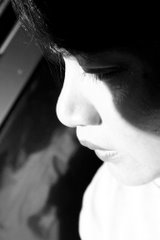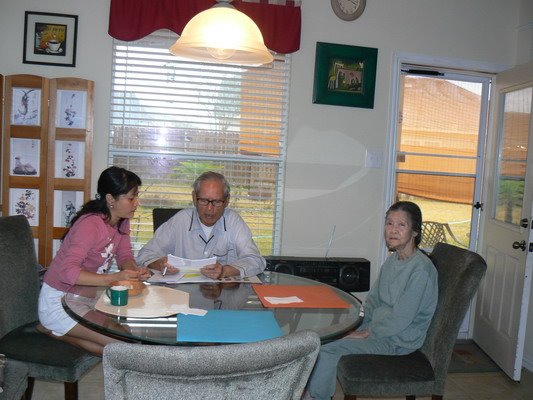
There are people who can read others like a book, but when being asked to define their own identity, they are in trouble. Once I was in that kind of trouble, too. I got stuck in finding a concrete answer for the abstract question: “What is identity in general and what is my identity?”. Then, I started reading all kinds of works - essays, novels, research papers ect- on this topic. I took notes of the various ways each author expresses his/her identities and based on his/her ways, I gradually discover how identity is disclosed.
Identity, I may say, is like the three layers of clothes we put on our body. The easy-to-be-seen outer layer – like a coat or a sweater- can be the genetic factors we inherit from our ancestors or the language we choose to speak in our daily life. The hidden middle layer – like a shirt - can be the knowledge that we get from our education or our socio-economic status in society. The deep down hidden-inside part – like an undergarment- can be the culture that influences us at birth or the values we always prioritize without expressing them in words.
Indeed, we can be defined by our “coat” - what we inherit from family and society. This is how Bharati Mukherjee, an Indian-born author, defined herself. In her essay “American Dream”, she wrote: “My identity was viscerally connected with ancestral soil and genealogy. I was who I was because I was Dr. Sudhir Lal Mukherjee’s daughter, because I was a Hindu Brahmin, because I was Bengali-speaking, and because my Desh- the Bengali word for homeland – was an East Bengal village called Faridpur” (53). Through this quote, I see her wearing a “coat” made of her religion, mother tongue, and national pride. We all can wear a coat with the same patterns and we all can change our coat as she did later. In fact, in the same essay, she added: “I choose to describe myself on my own terms as an American, rather than as an Asian American…because I committed myself to help shape the future of my adopted homeland.”
We can also be defined by our “sweater” - the language we choose to use. In “Mother Tongue”, Amy Tan - a famous novelist Chinese-American, explained how her identity was expressed via languages. Tan wrote: “Just last week, I was walking down the street with my mother, and I again found myself conscious of the English I was using, the English I do use with her” (121). What is amazing is her skill of switching smoothly from one identity to the other. In society, she defined herself as a well-educated woman in the way she used perfect English to her readers. At home, she identified herself as a loving daughter in the way she willingly used her mother’s broken English even though she knew that this imperfect English might make other people pay less respect to her mother and herself. In my case, I choose to manage my life in the US with two languages. By switching from Vietnamese at home to English in class and at work, I have taken a double-sided identity of an American resident of Vietnamese origin. I believe that this has been done to my own benefit. As my father often puts it, “Knowing a language is like living a life. Isn’t it great to know both Vietnamese and English and live two lives at the same time?” My “two lives” have indeed equipped my identity with an interesting outer layer.
Then, we can learn our identity thanks to the knowledge we get from our education. This kind of identity can be compared to the shirt we wear under the outside coat because it is not obvious at first sight. In the essay “Reading the History of the World”, written by Isabel Allende – a daughter of a Chilean diplomat living in Peru, Allende explained how she learned about her identity through reading experience. Allende stated:
After I read the feminist authors from North America, I could finally find words for the anger that I had all my life. I was brought up in a male chauvinist society and I had accumulated much anger, yet I could not express it. I could only be angry and do crazy things, but I could not put my anger into words and use it in a rational, articulate way. After I read those books, things became clearer to me, I could talk about that anger and express it in a more positive way (155 ).
Allende found herself troubled by a feeling of annoyance toward the male aggressive community. For some time, that bad feeling stayed there and could not be conveyed in words. However, one day, she read a book by a feminist writer who shared the same thoughts with her about “the male chauvinist society”. Only then could Allende classify herself as a feminist, like that writer (while only after reading Allende’s essay could I classify myself not as a feminist since I find myself indifferent to the male society who looked down on women)
Unlike the other three writers, the Stanford University degree journalist - Richard Rodriguez, viewed his identity from a socio-economic view – another kind of shirt we wear under the coat. In his article “Family Values”, Rodriguez emphasized that it was the economic situation that changed the identity of a woman who used to be the one who made the home. He wrote: “The American household now needs two incomes, everyone says. Meaning: Mom is forced to leave home out of economic necessity.” He also added: “Mom is only becoming an American like the rest of us. Certainly, people all over the world are going to describe the influence of feminism on women (all over the world) as their “Americanization.” And rightly so” (200). I find this point of view interesting, though my own mother is a different story. Never affected by any feminist movement, she has always been the professional homemaker who takes excellent care of us all, a family of ten. We are so grateful to her, the Soul of the family. She is the one who blows warmth into the house built by our father.
Rodriguez also viewed identity from a cultural aspect. He referred to this type of identity as “values”, the set of ideas that guide our concepts of life. We often keep this kind of identity deep down in us like the way we keep our undergarments close to our body. Rodriguez paid particular attention to the American value of individualism in the same article: “…Since we are inclined, as Americans, to think of ourselves individually, we are disinclined to think of ourselves as creating one another or influencing one another “(203). I think once the individualistic value is “crowned”, the family value loses its high rank. This aspect of American culture is to be contrasted with other Asian cultures, which consider family as a unit from which to build a society.
Regarding my identity, the “coat” that I wear is connected to my homeland- Vietnam and to languages I am using in my adopted land – the United State; the “shirt” to my social status and to my education; and my undergarments to my national culture. Apparently, people can see me as a Vietnamese girl who grew up in a communist country, and supposedly, I am influenced by Karl Marx’s theory. Now, I am settling my new life in a capitalist country. Living in a country where English is the first language, I have no choice but to use English to communicate with people in my outside daily life. However, as mentioned earlier, I do not give up my mother tongue because speaking it only does well to me. Besides, people can also see me as a Vietnamese immigrant in the United States. I am one of those low-income people who are managing life with no insurance or secure employment. The only surprising thing is that I quite enjoy it because it has left me with plenty of freedom and give me many chances to get good education – chances to put on a “shirt” of being a well-educated person. In fact, I am the youngest daughter of intellectual parents, so I am expected to finish college in my adopted homeland – the U.S and build up a respectable career here. Last but not least, I define myself as a family person because, like other Asians, I highly estimate the family value. This identity can be considered as my true self because wherever I live – in Vietnam or in the United State, I never change it. I keep this identiyty deep down to my heart like the way I keep my undergarment close to my body. My mother used to say “Family Tiiiiiime!” loudly to inform everybody that dinner was ready. Our family enjoyed a lot the dinner time - the time when the family got together and shared all the bad and good things of the day. Thus, we – our parents’ eight children living in Vietnam, Australia and America still say these two dear words in our own family.
In conclusion, like clothes we wear in winter, our identity is arranged in layers. These layers display how we are viewed by others in society. The question is which of these is our truest self. Which makes us belong to a group and which makes us differ from others? This reminds me of another quote I learnt in my English class relating to human identity: "Unlike a drop of water which loses its identity when it joins the ocean, man does not lose his being in the society in which he lives. Man's life is independent. He is born not for the development of the society alone, but for the development of his self." Another abstract quote relating to identity to think about!


















































